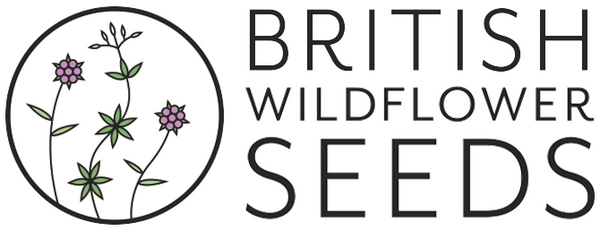About Our Seeds
Our Seed Mixes

British Wildflower Seeds sells packets of seeds either harvested from wildflower meadows or mixes put together from individual species. The seeds are the most recent available and cleaned, so they don’t include chaff or creepy crawlies! Each packet is packed to order, and should be used within a year of receipt. We don't bother with the kind of tiny amounts you'll usually find as a packet fill - 1g or 2g - but start at 20g of seed, usually enough for at least 5 square metres.
The “direct harvested” seed mixes are taken from meadows around the country, often ancient. They're typically either brush harvested or combined, and fall under the description of "Preservation Mixtures" in the 2011 Seed Marketing Regulations.
The standard mix for grasses:flowers in constructed mixes is 80:20 or even 90:10, although ours are 30% wildflowers. The grasses in these mixes are certified rather than wild. The % of wildflowers in direct harvest mixes is often as high as 50:50, often with an enormous variety of species represented. This means that they’re not just ecologically sound but also attractive, and offer great value for money.
“Wildflower seeds” are routinely mis-sold in the UK. It’s likely that the majority of “wildflower seeds” you’ll find online or at seed merchants are actually imported or agricultural cultivars, with limited value for wildlife (they look odd too, and live less long). Worse, many “wildflower” seed mixes sold at garden centres include – sometimes exclusively – flowers which are “wild” in foreign and exotic climes. These mixes have their place, of course, and they can be excellent for bees, for example, but we think it’s important that consumers understand what they are.
We have a network of suppliers and harvesters all round the country; skilled specialists including most of the best wildflower seed suppliers in the country. They are both large and small, including working farmers and trained botanists. Many have years of experience in harvesting, storing and processing wildflower seed. This can be more difficult than you could imagine! Some produce as little as 100kg of seed a year, harvesting seed sustainably from beautiful ancient meadows.
Why Native Wildflowers?
We think using plants indigenous to the UK is important for two reasons. Firstly, because people are forgetting what their native flora actually looks like, and forgetting its wonderful and diverse aesthetic appeal. Secondly, these plants are the basic building block for a diverse and fascinating ecosystem. I’m always amazed how quickly animals move in to newly established wildflower meadow areas, and at the growing variety that you can attract. This is one of the reasons we include grasses in all of our mixes; British meadow grasses not only look lovely but provide the habitat and food plants many animals need. There's increasing evidence that our pollinators prefer native flowers to ornamentals too.
It’s important to try to use not just UK sourced seed, but if possible local seed mixes. These are likely to be more successful, more distinctive and diverse, and look more appropriate to the local landscape. They will be more helpful to local fauna, and also help preserve local genetic variations. It will come as no surprise to hear that the folk who produce these mixes aren’t large seed merchants or agricultural companies; British Wildflower Seeds uses small, dedicated and knowledgeable suppliers who deserve our encouragement and support.
Chemicals
We can find very few organically certified sites to harvest from, although most of the direct harvest mixes have very low or no chemical inputs. They may have no inputs other than from grazing livestock. Herbicides are sometimes selectively used in the production of some of the other seed mixes here. No insecticides or neonicotinoids are used in any. To my knowledge there isn't the organically certified seed available in the UK produced in commercial quantities to combine into constructed mixes.
2025/6
We're delighted to be stocking more "direct harvest" mixes this year - i.e. harvested directly from donor sites. These represent great value for money and are often super floral and diverse. The 2025 harvest was very difficult and volumes were down sharply, so early purchase is recommended!
How To...
You will find instructions on seeding and establishment on the back of every seed packet, as well as a lot of information here. If you need further help please get in touch.
